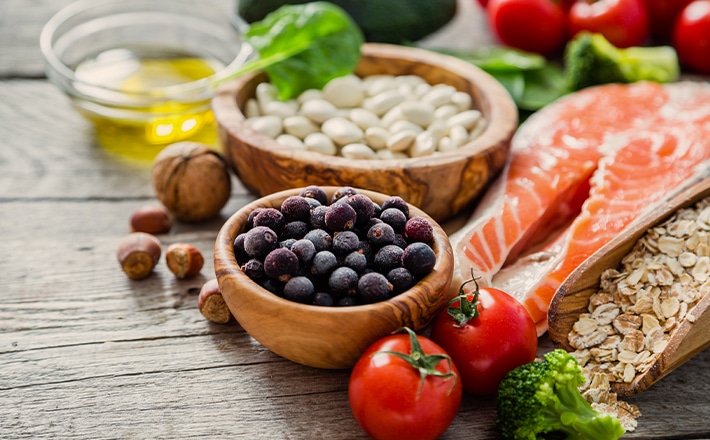In search of a food system that is just & good

In World Diabetes month we’re looking at how poverty and non-communicable diseases go together.
So, just noting this here: one in eight South African adults are thought to be diabetic (here’s a clear explanation of what that means).
Unless it’s well managed, diabetes is a miserable condition. it causes nerve damage that makes feet and hands numb and can in time require amputation; it leads to eye and dental disease, and increased vulnerability to other conditions (like flu viruses, including the Covid-19 coronavirus); and it has a linear connection to life-threatening cardiovascular and kidney disease.
What does it mean to manage diabetes well?
To some extent, it’s medication – daily injections and/or pills. More importantly – especially with Type 2 diabetics where the pancreas is still in the game, although imperfectly – it means healthy eating and cleaning up your lifestyle.
THE POOR ARE MOST SUSCEPTIBLE
Among all the other inequities in our society, poor people are most susceptible to diabetes, along with all the other non-communicable diseases like cancer, heart disease, hypertension etc. That’s because healthier foods – including fresh vegetables – cost more. The majority of South Africans, even if they have full bellies, live in what scientists call an obesogenic environment: one that promotes weight gain, makes weight loss difficult, and goes hand-in-hand with under-nutrition and lifestyle diseases.
The V&A Waterfront’s commitment to doing our part to fix the broken food system* in Cape Town and our region is therefore not just about supporting efforts to address the crisis of hunger. It is also a commitment to helping more people access affordable, healthy foods and achieve better health, and thence a better quality of life.
The “Local Voices series in 2021’s Food Dialogues spoke to this with considerable urgency. “People eat what they can afford. They spread things, and they bulk it up, and try and feed more people with less, said Benson Arendse, a food entrepreneur who works with communities to achieve greater food independence.
“Sickness is in the pot, and also healing is in the pot,” adds Siphokazi Sompeta, an occupational therapist who works with “grannies” to support their health, wellbeing, food and nutritional needs: “They say: ‘You tell me to eat veggies, but at home I eat mielie meal the whole day’.”
THE FORMAL / INFORMAL CHALLENGE
It’s a local issue, but also a global one. A Food Dialogues “Global Events, Local Insights” panel discussion joined the dots with some of the themes at the UN Food Systems Summit, which took place concurrently, and found that one of the common challenges lies in how city governments can support so-called informal farming businesses without compromising the functional / legalities of city management.
In Cape Town, said panelist Nomonde Buthelezi, a farmer and co-founder of the Food Agency Cape Town (FACT), local small farmers have battled fruitlessly to achieve City of Cape Town support in the form of vital infrastructure such as piped water, and access to market. Farmers in Nairobi have the same problem, said fellow panelist Solophina Nekesa of ICLEI: there, a food system policy currently in draft fails to acknowledge the role of the small-scale actors who play a big role in the system.
Also on the panel was Jean-Paul Adam of the UN Economic Commission for Africa (Uneca), who identified a further tension: if further industrialisation of food production is necessary to achieve food security, where does that leave small urban farmers? A burning question, he said, was how corporate systems might create opportunities for small producers and food SMMEs to be properly involved in food production.
Some answer might lie in how we think about what is important, argued the fourth panelist, Jane Battersby of the University of Cape Town’s African Centre for Cities. When protection was created for agricultural land in Cape Town, for instance, the focus was on areas with high historical context and major economic impact, e.g. wine-producing land, not food-producing land. “In a city context, food production hasn’t been seen as an important problem, because food is assumed to come from somewhere else, and so everything else is nice to have, and extra, and not foundational.
“We need to shift our understanding as to what creates a local food system.”
WHY WE HAVE TO GET IT RIGHT
What SOLVE@Waterfront is working towards with others, is a proper understanding of what it takes to make a food system that is just and sustainable, and that supports health and wellbeing. If as a society we get this right, we address one of the compelling injustices of our time. Until we do, the price continues to be what it has always been: an unforgivable dereliction of human rights, and a profound loss of quality of life for the majority of our people.
Catalysed by the crisis of the pandemic, there is considerable energy amongst stakeholders. If you’d like to get involved, or to connect your own efforts with those of others, we’d love to hear from you.
* A food system, according to a UN definition, “gathers all the elements, environments, people, inputs, processes, infrastructures, institutions etc and activities that relate to the production, processing, distribution, preparation and consumption of food, and the outputs and the activities, including socio-economic and environmental outcomes.” In other words, when we talk about food systems, we’re not talking about just the food dimension: we’re talking about everything that feeds into the system (like climate change, urbanisation, the local regulatory environment) and everything that the system throws up, like production of greenhouse gases, food waste, etc.
Find all of the Food Dialogues videos on the Food Dialogues YouTube channel.